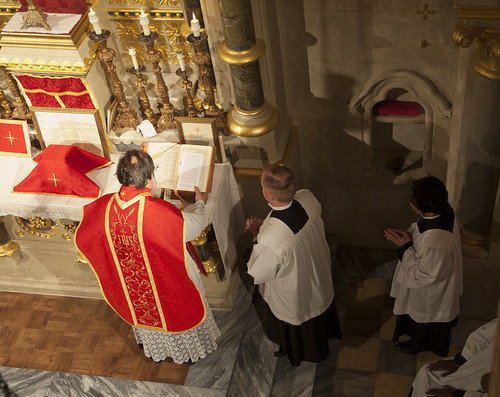 |
| Reading the Epistle: Fr Gabriel Diaz at Corpus Christi, Maiden Lane |
We are delighted to announce the opening of bookings for the Latin Mass Society's Latin and Greek Summer School: an intensive course of one week looking at the Latin of the liturgy for beginners and intermediate students, and New Testament Greek for students with the basics of the language. It will take place 8-13 August at Park Place Pastoral Centre in Hampshire. We also have on-line courses to recommend; all of these have huge discounts for clergy.
Jean-Michel Blanquer, France's Education Minister, is re-introducing the study of Latin and Greek into France's professional schools: it will be possible to study them as part of the 'technical' baccalaureate. This is part of an international effort to 'strengthen the EU', alongside Italy, Greece and Cyprus.
Here is The Times, here is The Telegraph: both paywalled; here's a parallel report from RT.
It is part of President Macron's 'war on woke', apparently. Blanquer ridiculed the idea that teaching Latin promotes racism, which, predictably enough, has found a home in the once-elite University of Princeton.
Obviously one has to reject such an idea if one wants to promote the study of the Classics. But Blanquer's motivation is about putting young people in touch with the common cultural roots of Europe.
A similar idea was recently expressed in Le Figaro, where Sundar Ramanadane suggested that Latin be the language of the EU's institutions. Seriously! After all:
Latin carries within it two millennia of a culture as varied as its authors were: it was the link between a Europe of minds who, through time and across space, have debated, disputed, but always with a common identity as a backdrop. Latin also structured the languages we speak today in Europe, in their grammatical construction or in their lexicon: it crosses national boundaries.
...
Finally, a Latin-speaking Europe would symbolize the strength, rigour, and will to power (something that Europe has recently attempting, albeit timidly, to assume), the will to unite many peoples around it. It would then be the language of an entity which would have another ambition than that of being a cartel of states representing, for the largest of them, just over one percent of the world's population.
So 'Latin deserves to become the language of Europe again.'
He concludes:
If Europe one day aspires to develop a European identity beyond national characteristics, and to be something other than a grant-giver and a great regulator, (things that are not criticized in themselves), it must acquire a language which, unlike this laboratory language that is Esperanto, has a rich history, and reflects a historical legacy in which the peoples recognize themselves and under which they can consider uniting.
So maybe this has some traction. It would take fifty years of pushing Latin in schools across the EU to make the idea of using it as an official language even remotely plausible. Nevertheless, it is true that the multilingual European Union, since Brexit not so firmly hitched to English-speaking culture, has a common culture in the Classics. Latin is the origin of the Romance languages of western and southern Europe, and has in modern times had a very important place in the cultures of central European countries as well. Germans have less Latin influence on their language than the French, but they, like the Russians, have a case system, and German classical scholarship is renowned--or once was. It was an officially-used language in Poland, Hungary, and Croatia, for many centuries up to the 18th or 19th century.
If the citizens of the EU are ever to feel at home with each other, they need to nurture this common culture. Teaching children Latin and Greek is an indispensable first step, even if they never get to the point of giving speeches in Latin in the European Parliament, as the Croats used to do in theirs.
Check out the LMS Latina and Greek residential course here.
Support the Latin Mass Society

No comments:
Post a Comment